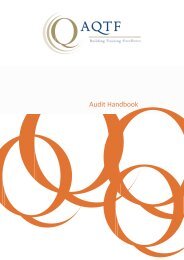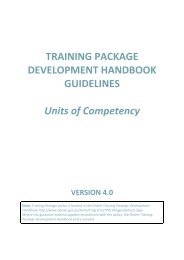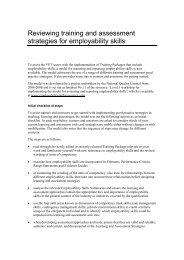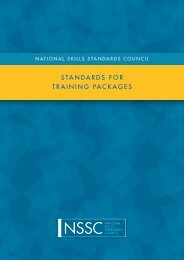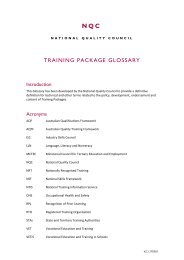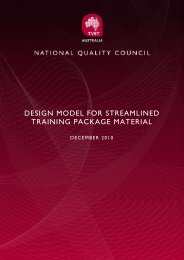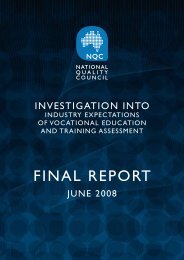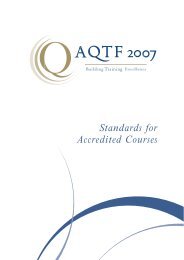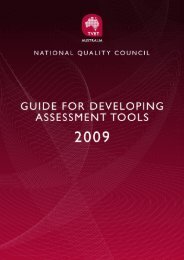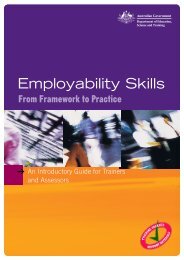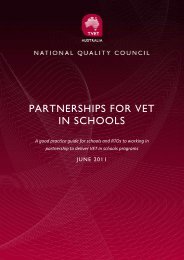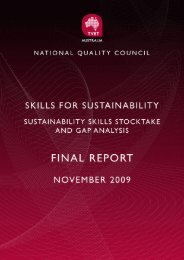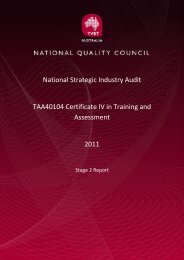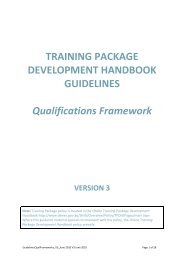VET Products for the 21st Century - National Skills Standards Council
VET Products for the 21st Century - National Skills Standards Council
VET Products for the 21st Century - National Skills Standards Council
Create successful ePaper yourself
Turn your PDF publications into a flip-book with our unique Google optimized e-Paper software.
There are mixed views about whe<strong>the</strong>r or not to staywith <strong>the</strong> status quo or to introduce a nationalsystem. It is generally agreed that <strong>the</strong>re is a needto streng<strong>the</strong>n national approaches to credit transferand articulation between <strong>the</strong> <strong>VET</strong> and HigherEducation sector, but less agreement on. how thisshould occur. The consultations found that <strong>the</strong>re islittle support <strong>for</strong> complex and administrativelyburdensome credit arrangements, however <strong>the</strong>re isstrong support <strong>for</strong> developing a simple, nationallyconsistent approach to credit transfer andarticulation.Given that <strong>the</strong> Australian Qualifications Framework<strong>Council</strong> (AQFC) is currently working to <strong>the</strong> DeputyPrime Minister’s brief ‘to improve articulation andconnectivity between <strong>the</strong> university and <strong>the</strong> <strong>VET</strong>sectors to enable competency-based and meritbasedsystems to become student focussed’ and<strong>the</strong> critical <strong>VET</strong> expertise in this area that can beoffered by <strong>the</strong> NQC. The JSC recommends that ajoint working group of <strong>the</strong> AQFC and <strong>the</strong> NQC be<strong>for</strong>med to progress work on <strong>the</strong> AQFC projectsrelated to pathways and streng<strong>the</strong>ning <strong>the</strong>Australian Qualifications Framework.In <strong>the</strong> meantime <strong>the</strong> JSC recommends taking a ‘fit<strong>for</strong> purpose’ approach during <strong>the</strong> design anddevelopment of Diplomas and Advanced Diplomasto include articulation arrangements whereappropriate.RecommendationsThat <strong>the</strong> NQC:13. Establish a joint working group of <strong>the</strong> NQC and <strong>the</strong> Australian Qualifications Framework <strong>Council</strong> (AQFC) toinvestigate introducing a national credit system through <strong>the</strong> work on AQFC projects related to pathwaysand streng<strong>the</strong>ning <strong>the</strong> Australian Qualifications Framework.14. Ensure that Training Package developers include articulation arrangements in <strong>the</strong> design and developmentof Diploma and Advanced Diplomas where appropriate.5 . 5 L a n g u a g e , L i t e r a c y a n d N u m e r a c yThe consultation acknowledged that <strong>the</strong>re are arange of arrangements <strong>for</strong> addressing <strong>the</strong> needsof learners with low level basic language, literacyand numeracy (LLN) skills (including <strong>the</strong>Australian Core <strong>Skills</strong> Framework, and AdultBasic Education qualifications). LLN peakbodies, practitioners and administratorsemphasised however, <strong>the</strong> importance of having<strong>the</strong>se arrangements located under <strong>the</strong> umbrellaof <strong>the</strong> national framework and integrated intoTraining Packages <strong>the</strong>mselves.It was also felt that <strong>the</strong> exclusive use ofaccredited courses to deliver stand alone LLNtraining would decrease <strong>the</strong> status and value ofLLN provision. Many feel that <strong>the</strong> development ofLLN skills needs to be grounded in learning thathas a purpose, such as vocational learning,ra<strong>the</strong>r than solely in general programs. LLNshould not just be considered as purelypreparation <strong>for</strong> entry-level programs, but also asa component of <strong>the</strong> continuing cognitivedevelopment associated with higher levelcompetence. Those consulted believe thatdespite <strong>the</strong> opportunities and programs alreadyavailable, <strong>the</strong> levels of LLN possessed bystudents remain far too low to meet competencyrequirements and are not being adequatelyaddressed. They also believe that this situationis equally <strong>the</strong> case <strong>for</strong> ex-school entrants to <strong>VET</strong>and <strong>the</strong> work<strong>for</strong>ce, and <strong>for</strong> older workers seekingto upgrade <strong>the</strong>ir skills.There<strong>for</strong>e, <strong>the</strong>re is underlying support <strong>for</strong> makingbasic competency in language, literacy andnumeracy, knowledge and core skills (such asoccupational health and safety), as defined by<strong>the</strong> relevant Training Package, a requirement <strong>for</strong>participation in qualifications at Certificate III andabove.RecommendationThat <strong>the</strong> NQC:15. Ensure that Language, Literacy and Numeracy requirements are made more explicit in <strong>the</strong> development ofoccupational and foundation qualifications.<strong>VET</strong> PRODUCTS FOR THE 21 ST CENTURY - 17



